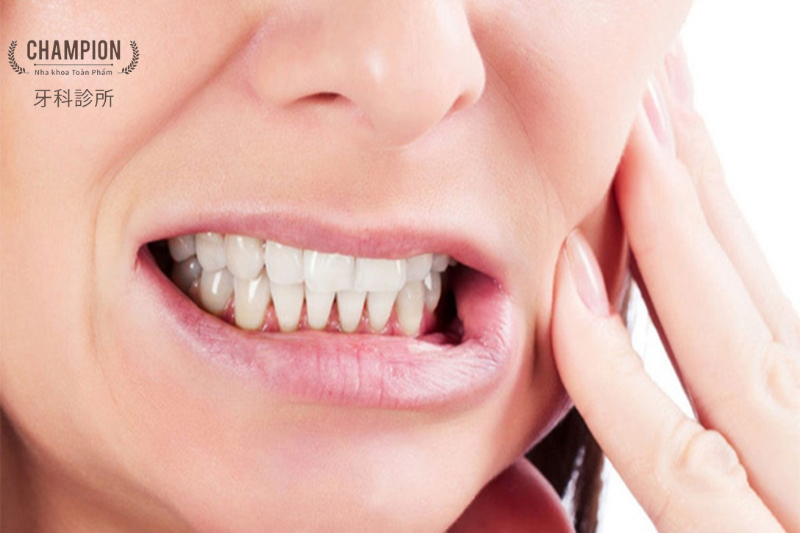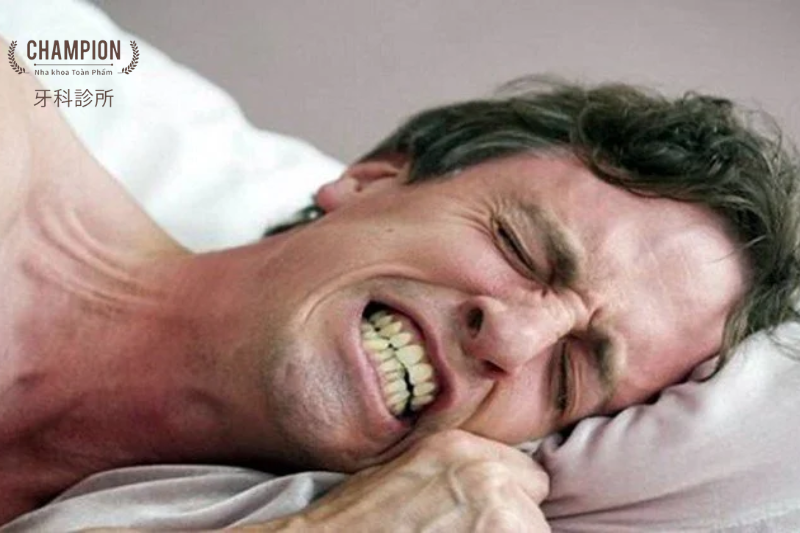Tooth cracks caused by teeth grinding is one of the serious consequences that this bad habit can cause. In addition, teeth grinding is also the cause of many other oral health problems.
Early identification of the signs of teeth grinding and seeking the help of a dentist is very important to protect oral health. Let's explore in more detail the relationship between teeth grinding, tooth cracks, and other oral health issues in the following article.
Teeth Grinding - The Silent Enemy of Healthy Teeth
Teeth grinding is an unconscious habit that many people suffer from. This habit may seem harmless, but it can have negative impacts on oral health. Let's explore teeth grinding and its consequences in more detail.
What is Teeth Grinding?
Teeth grinding (bruxism) is the act of clenching or grinding the teeth together when not chewing or swallowing. This action often occurs unconsciously during sleep or even while awake. Teeth grinding exerts a lot of pressure on the teeth, leading to various oral health problems.
The Incalculable Damage of Teeth Grinding
Teeth grinding can cause serious harm to the teeth:
- Wearing down of tooth enamel, making the teeth more sensitive and prone to cavities
- Cracking, breaking, or chipping of teeth
- Damage to dental restorations like fillings, crowns, etc.
- Causing temporomandibular joint (TMJ) disorders, headaches, and ear pain
- Disrupting sleep and causing fatigue
Who is Prone to Teeth Grinding?
Teeth grinding can occur at any age, but is most common in:
- Children during the tooth development stage
- Older adults with oral health issues
- People experiencing stress, anxiety, or depression
- Those with habits of using stimulants like coffee, alcohol, or tobacco

Tooth Cracks - The Serious Consequence of Teeth Grinding
Among the negative consequences caused by teeth grinding, tooth cracks are one of the most concerning issues. Tooth cracks not only make your smile less aesthetically pleasing, but also cause painful and uncomfortable sensations when eating and chewing.
If tooth cracks are not detected and treated in a timely manner, they can lead to more serious complications like pulpitis (inflammation of the dental pulp), affecting overall oral health.
The Relationship Between Teeth Grinding and Tooth Cracks
When you grind your teeth, a very strong force is generated and applied to the tooth surface. If this force is repeatedly exerted over a long period, it will gradually weaken the tooth structure.
This makes the teeth more fragile and prone to cracking or breaking. In severe cases of teeth grinding, the excessive pressure can cause the tooth to completely fracture, leading to significant damage to oral health.
Common Types of Tooth Cracks
Depending on the severity and location of the crack, we can classify tooth cracks into the following types:
- Enamel cracks: This is the mildest form of crack, only appearing on the enamel surface of the tooth. These cracks are usually small and thin, and may not cause obvious symptoms.
- Dentin cracks: In this type of crack, the fissure has penetrated through the enamel and into the softer dentin layer underneath. Dentin cracks often cause sensitivity and pain.
- Root cracks: When the crack extends all the way down to the tooth root, it is considered a serious crack that affects the portion of the tooth below the gums. This type of crack can lead to inflammation and threaten the tooth's viability.
- Vertical root fractures: This is a case where a large portion of the tooth's root structure has broken off. If the fracture reaches the dental pulp, it can cause excruciating pain and high risk of infection.

Identifying the "Culprit" Causing Tooth Cracks
Early detection of the signs of teeth grinding is the first important step in preventing tooth cracks caused by this bad habit. Let's explore some common symptoms of teeth grinding so that timely interventions can be taken.
Daytime Symptoms
- Pain or soreness in the jaw muscles, especially in the morning after waking up
- Unexplained headaches in the temporal region or ear pain
- Difficulty opening the mouth wide due to tightened jaw muscles
- Tooth sensitivity and discomfort when consuming hot or cold foods
Nighttime Behaviors
- Making grinding or clenching noises during sleep
- Loud snoring, irregular breathing, and potential sleep apnea
- Shallow, disturbed sleep, easily startled or awakened
- Feeling fatigued and drowsy during the day due to poor sleep quality
Visible Signs on Teeth and Jaw
- Worn-down tooth surfaces or chips/cracks on the tooth edges
- Inflamed, swollen, and painful gum tissue around the teeth
- Indentations on the tongue or inner cheeks from clenching during sleep
- Misalignment of the lower jaw in relation to the upper jaw when biting down
>> See more: Reliable Dental Clinic for Safe Tooth Loss Treatment in Ho Chi Minh City
Dealing with Teeth Grinding
After identifying the signs of teeth grinding, the next step is to find ways to overcome this habit. Treating teeth grinding not only helps protect teeth from the risk of cracks and fractures, but also brings many benefits to overall oral health and jaw function.
Teeth Grinding Treatment Methods
- Wearing a nightguard: A nightguard is a custom-made dental appliance that is worn at night to reduce the pressure on the tooth surfaces during grinding.
- Orthodontic correction of bite misalignment: If teeth grinding is caused by an improper bite, the dentist may use orthodontic treatments like braces or dental restorations to realign the bite.
- Botox injections into chewing muscles: Botox has a relaxing effect on muscles, so injecting it into the chewing muscles can help reduce muscle clenching and grinding.
- Psychological therapy: Stress and anxiety are often the root causes of teeth grinding. Psychological treatments like meditation, yoga, and cognitive-behavioral therapy can help reduce stress and improve the grinding condition from the source.
The Importance of Nightguards
Nightguards are considered one of the most effective measures to protect teeth from damage caused by grinding. Nightguards are custom-made from clear, durable plastic and fit snugly over the teeth.
The nightguard creates a cushion between the upper and lower jaws, preventing direct contact between the teeth during grinding. Consistent and proper use of a nightguard can significantly reduce the pressure on the teeth, preventing cracks and other related oral health issues.

Lifestyle Modifications
Alongside dental interventions, adjusting one's lifestyle also plays an important role in managing teeth grinding:
- Reducing stress through relaxing activities like meditation, music, and physical exercise.
- Adjusting sleep habits to ensure adequate and regular sleep.
- Avoiding stimulants like coffee, tobacco, and alcohol that can irritate the jaw muscles.
- Practicing tongue positioning and keeping the teeth apart when not chewing.
Summary
Teeth grinding is a harmful habit that can lead to cracked teeth and many serious oral health problems. Early recognition of teeth grinding signs and seeking timely help from a dentist are crucial to protecting your dental health.
At Nha Khoa Champion Dental Clinic, our team of highly skilled dentists and state-of-the-art facilities are ready to support you on your comprehensive oral health journey. Remember, a radiant and healthy smile is the key to unlocking success and happiness in life.
Vietnamese & English: (028) 5411-2295
中文: (028) 5411-2297 172 Nguyen Luong Bang, Tan Phu Ward, District 7, Ho Chi Minh City.
Fanpage: Champion Dental Clinic 牙科診所
Zalo: Champion Dental Clinic
Youtube: Champion Dental Clinic 牙科診所
 Champion Dental Clinic
Champion Dental Clinic



